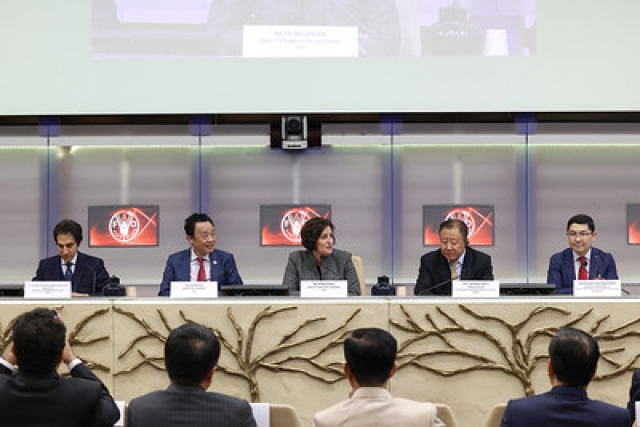Scaling up Sustainable rice-based production systems via South-South and Triangular Cooperation

2023-11-17, ()
On the sidelines of the 6th International Rice Congress 2023, which saw the attendance of the President of the Republic of the Philippines Ferdinand R. Marcos Jr., policy makers, researchers, and practitioners from 16 to 19 October 2023, FAO organized a session “Scaling up Sustainable rice-based production systems - understanding the farmer’s needs” along with representatives from national agriculture research institutions in Tanzania and Cote d’Ivoire, who presented the challenges and potentials of the rice sector in each country.
During the session, Mr Kenya Konno, Programme Officer, South-South and Triangular Cooperation Division said. “FAO has decades of experiences in assisting South-South Cooperation in the rice sector, in particular bridging between African and Asian countries through promoted exchanges of expertise and experiences. FAO provides a solid foundation, in order for multiple countries to smoothly work together through facilitating the national-level arrangements on South-South cooperation”.
Following the International Rice Congress, the practitioners from Tanzania and Cote d’Ivore visited the Philippine Rice Research Institute (PhilRice) and its testing field and the Philippine Center for Postharvest Development and Mechanization (PhilMec) as part of the Study Tour.
“In Tanzania, we have a plan to establish a Rice Gene bank. However, it remains just as a plan since we consider it requires the establishment of a cold room to maintain the low temperature for the entire room and it requires a large amount of investment. It was therefore eye-opening for me to see the gene bank in PhilRice. Here, they simply procured 27 refrigerators in an ordinary room and the gene bank is fully operational, preserving 18,000 rice varieties!” Dr Kulwa Furahisha Miraji, Researcher from the Tanzania Agricultural Research Institute (TARI) said during the tour.
“This is the methodology widely used, not only in the Philippines. A similar set up is utilized in other countries such as Malaysia, Indonesia, Nepal and Bangladesh.” Mr Malvin Duldulao, Information Systems Analyst, Genetic Resources Division of PhilRice explained.
Final thoughts were also shared by Mr Christian Kouame Bi, Director of Production Support, Agence Pour le Developpement de la filiere riz (Rice Development Agency) of Cote d’Ivore “What impressed me the most was the gender friendly machineries produced in the Philippines. Look at this seedling machine for example! Those machines are light and easy to handle even by women. These small machines are adapted to small farms and affordable for rice producers. Back in my country, most of the machines are very heavy and difficult for women to use. It would be great if we can introduce such machineries in our country” he added.
The group also visited the rice mill and observed the functioning of the rice harvester in the testing field.
These valuable exchanges among the three countries are supported by the project “Capacity development and experience sharing for rice value chains through south-south and triangular cooperation (SSTC)” funded through the generous contribution of the government of the Republic of Korea.
Contact
FAO
Adel Sarkozi
Global Media Relations
+39 06 570 52537
[email protected]
FAO
Adel Sarkozi
Global Media Relations
+39 06 570 52537
[email protected]

